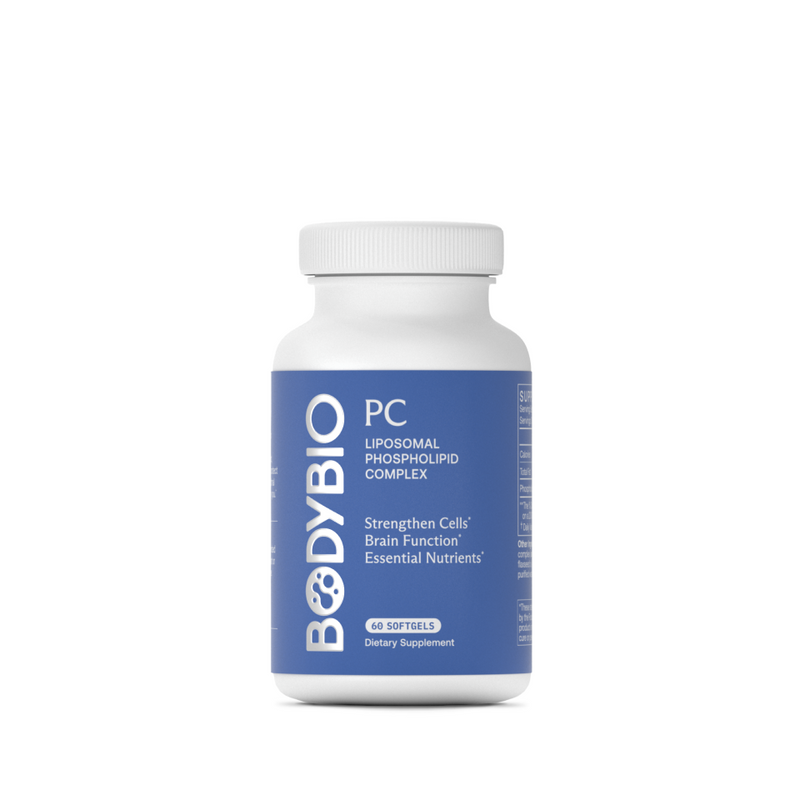Popcorn Brain Explained: What It Is, Why It Happens, and How to Increase Attention Span
Authors:

Dr. Thomas Wnorowski
PhD, CNCC Research Director, BodyBio & Biomedical Nutritionist
Key Takeaways:
Key Points:
- “Popcorn brain” is a term used to describe a state of mind where a person’s attention span is significantly reduced due to constant digital stimulation.
- The symptoms and effects of popcorn brain can disrupt daily life, but there are natural ways to manage and improve your focus.
- By understanding its impact and implementing strategies to manage digital consumption, we can reclaim our focus, improve our mental health, and foster more meaningful connections in our lives.
The never-ending doom scroll, constant notifications, phone calls, texts, emails — not to mention, many of our jobs involve long hours staring at screens.
It's digital stimulation overload every single day. This constant stream of distractions can cause a phenomenon known as “popcorn brain.” Popcorn brain might play a part in our shortened attention spans, disrupted sleep schedules, and may even cause additional health concerns over time.
Table of Contents:
- What is Popcorn Brain?
- Popcorn Brain Symptoms and Effects
- How to Increase Attention Span
- A Modern Challenge in a Hyperconnected World
What is Popcorn Brain?
“Popcorn brain” is a term coined by Professor David Levy, a professor at the University of Washington Information School, in 2011 to describe a state of mind where a person’s attention span is significantly reduced due to constant digital stimulation.
Think of popcorn kernels rapidly popping in the microwave. It’s an evocative image to represent thoughts popping around your brain that you can’t quite seem to pin down. Not to mention the idea that your brain is overheating and practically blowing off steam with all of the overstimulation on a daily basis.
Popcorn brain can lead to decreased attention span and difficulty focusing on less stimulating tasks. Although the exact cause of popcorn brain has not been identified, some causes may include:
- Excessive Screen Time: Spending extended amounts of time on devices can make it harder to concentrate on non-digital activities.
- Instant Gratification: The internet and social media provide quick rewards and spike dopamine in the brain, which can make everyday tasks seem dull and less interesting.
- Constant Notifications: Frequent alerts and notifications can fragment our attention, cause lots of mental interruptions, and make it difficult to focus on a single task.
- Multitasking: Switching between different apps or tasks can overload the brain’s cognitive processes, leading to reduced attention spans.
Symptoms of Popcorn Brain
We’re surrounded by digital stimulation all the time. Our careers involve screens, our “relaxation” time includes screens, and we use technology to communicate with friends and family.
As our screen time and overstimulation increase, it can be difficult to recognize some of the common symptoms of popcorn brain as they start to seem “normal.” But while they are common, they’re not normal.
These symptoms may include:
- Reduced attention span
- Constant need for stimulation
- Difficulty concentrating
- Mood disturbances
- Poor sleep quality
- Impulsivity
- Cognitive overload
The Consequences of Popcorn Brain
How does popcorn brain affect our daily lives?
With a greatly reduced attention span, popcorn brain can cause difficulty concentrating, which may lead to decreased productivity and efficiency at work or school.
A reduced attention span drives us to search for constant, fast, digital stimulation. As you may have experienced, constantly looking down at your phone can interfere with face-to-face interactions. You might find it hard to engage in conversations or be fully present with friends and family. This effect is especially damaging to children and teens, who are still learning to socialize and interact with the world around them.
This constant bombardment of information and stimulation can lead to feelings of anxiety, stress, and overwhelm — which can lead to mood swings and irritability, potentially affecting relationships and overall well-being.
Our physical health may also be affected by prolonged screen time through symptoms like eye strain, headaches, poor posture, lack of physical activity, and poor sleep quality. Poor sleep can also result in fatigue, making it harder to function during the day and creating a continuous cycle of fatigue and chasing instant gratification.
As we all know, lack of physical activity can also contribute to other long-term health concerns, including cardiovascular disease, mental health disorders, and more.
Methods to Increase Attention Span
With all the digital stimulation we experience (some of which we have no choice in), maintaining a strong attention span can be challenging. Luckily, some methods and strategies can help increase our attention span and enable us to stay engaged and productive in our lives.
Mindfulness and Meditation Techniques
Mindfulness and meditation can be powerful tools to combat popcorn brain.
- Mindful Breathing: Silence your notifications, sit somewhere comfortable, and focus on taking slow, deep breaths. Pay attention to the sensation of air entering and leaving your body. This practice helps anchor your mind and reduce distractions.
- Guided Meditation: Use an app or YouTube video for guided meditation. These resources can help you stay focused and provide structure to your meditation practice.
- Single-Tasking: Practice focusing on one task at a time. Fully engage with this task before moving on to the next one. This trains your brain to avoid constant multitasking.
- Yoga: Incorporate yoga into your daily or weekly routine to combine physical movement with mindfulness. Yoga helps improve concentration and reduces stress.
Digital Detox Strategies
One of the best ways to combat popcorn brain is to create boundaries with your tech devices.
- Adjust Screen Time Settings: Limit exposure by setting time limits for apps. You can also turn off non-essential notifications.
- Designate “Tech-Free” Zones: Decide on specific times or areas of your home where electronics are off-limits.
- Give Yourself a “Digital Detox”: Reduce or eliminate screens on weekends or family vacations.
Enforcing boundaries with your screen time and devices can help you regain control over your attention span by limiting digital distractions and instant gratification sources. Your brain will begin to readjust to a more normal dopamine level and gain dopamine from less stimulating activities, like completing a work project or practicing a creative hobby.
These boundaries allow your brain to reset and recover while improving productivity, reducing stress, and allowing your brain to focus on the task at hand.
Neuroplasticity and Focus Exercises
Neuroplasticity refers to the brain’s ability to rewire itself for better physical and mental health by forming new neural connections. This adaptability allows the brain to recover from injuries, adapt to new situations, and improve cognitive functions.
Engaging in activities that promote neuroplasticity, such as learning a new language or playing a musical instrument, can enhance your brain’s ability to focus and process information more efficiently. The trick is not using technology to engage in these activities and further promoting those quick dopamine hits.
By regularly challenging your brain with new tasks, you can improve your attention span and reduce the tendency to get distracted by digital stimuli.
Focus exercises are designed to improve your ability to concentrate on a single task for an extended period. For example, the Pomodoro Technique can help retrain your brain to maintain attention and resist the urge to multitask. To practice this technique, set an alarm for 25 minutes and focus only on one task, then take a five-minute break (without screens). Continue alternating between focused work times and breaks until you complete the task.
Supplements and Physical Fitness
Alongside lifestyle changes to reduce screen time, certain supplements can support brain health and improve cognitive function, which may help reduce the symptoms of popcorn brain.
- Nootropics: Nootropics are supplements that enhance memory, cognitive function, and concentration. These supplements could help mitigate some symptoms associated with popcorn brain by improving brain health and function.
- Omega-3 and Omega-6 Fats: Found in fish oil and certain plant-based oils such as Balance Oil, these polyunsaturated fats are known to support brain health and boost focus and memory.
- B Vitamins: These vitamins, especially B6, B9 (folic acid), and B12, are essential for brain function and can help boost mental stamina.
- L-Theanine: Often found in tea, this amino acid can promote relaxation without drowsiness, helping to improve focus and reduce stress.
- Phospholipids: Known as the building blocks of cell membranes and the protectors of your cells, these healthy fats allow nutrients into the cell and move waste out — with some help from proteins. Since your brain is mostly made of fat, phospholipids can help promote improved brain function, focus, and mental clarity.
Exercise improves and increases blood flow to the brain and is known to help reduce stress, boost energy levels, increase neuroplasticity, and boost the production of endorphins. Movement is always a great addition to a healthy lifestyle and targeted supplement regimen.
A Modern Challenge in a Hyperconnected World
Popcorn brain is a modern challenge that many of us may face in our digitally overstimulated world. By understanding its impact and implementing strategies to manage digital consumption, we can reclaim our focus, improve our mental health, and develop deeper, more meaningful connections in our lives.
It’s not about completely disconnecting from technology, but finding a balance that allows us to thrive both on and offline.
American Psychological Association. (n.d.). Why our attention spans are shrinking, with Gloria Mark, Phd. American Psychological Association. https://www.apa.org/news/podcasts/speaking-of-psychology/attention-spans
Are you struggling with “Popcorn brain”? SOVA. (2024, March 29). https://sova.pitt.edu/are-you-struggling-with-popcorn-brain/
Graham, E. (2011, August 9). Monitoring the monitors. Manassas, VA Patch. https://patch.com/virginia/manassas/monitoring-the-monitors
Kim OY, Song J. Important roles of linoleic acid and α-linolenic acid in regulating cognitive impairment and neuropsychiatric issues in metabolic-related dementia. Life Sciences. 2024;337:122356. https://doi.org/10.1016/j.lfs.2023.122356
Yoon, J. H., Seo, Y., Jo, Y. S., Lee, S., Cho, E., Cazenave-Gassiot, A., Shin, Y. S., Moon, M. H., An, H. J., Wenk, M. R., & Suh, P. G. (2022). Brain lipidomics: From functional landscape to clinical significance. Science advances, 8(37), eadc9317. https://doi.org/10.1126/sciadv.adc9317

